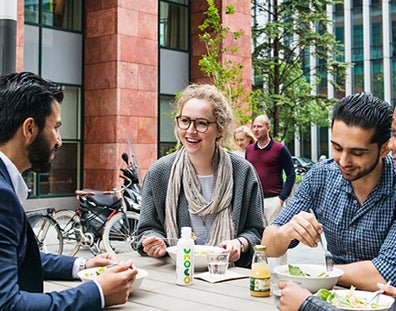Refugees of the Syrian Civil War who have escaped warfare are subsequently forced to navigate urgent and complex legal issues in pursuit of state protection and safety. A Filipino parent seeking reunification with their family in Europe faces similar obstacles. Both are confronted with the interrelationships between humanitarian and human rights law, and the interactions between international and domestic legal systems.
Due to the complex interplay between different jurisdictions and fields of law, international migration and refugee law must be analysed from a multitude of angles and disciplines. This specialisation studies international migration from the perspective of international and European law, and focuses on how they function in domestic legal orders.
During the master program, you will have plenty of opportunities to work on your skillset. While all offered courses will enable you to further explore your academic capabilities, the degree is highly focused on practically preparing students for a career in the field of migration. Compulsory as well as elective courses such as Refugee and Family Migration Law, Irregular Migration, Philosophy of International law and Migration and the Migration Law Clinic will allow you to work on writing skills and critical reflection. The degree also offers a space for the improvement of oral skills with the moot courts and working groups of the compulsory course Migration and Legal Remedies.
The Migration Law Clinic is a unique opportunity to bridge the gap between academia and legal practitioners, offering students the chance to write expert opinions in real migration law cases that are pending before national and European courts. During the clinic, participants define and work on their own learning goals, such as cooperation or communication skills and reflect on the development of those skills during the course.
Master students are also encouraged to enhance their skills by taking part in extracurricular activities by, for example, volunteering for refugees, writing blogs for the Verblijfblog, taking part in moot court competitions or presenting work experiences to their fellow students.
The programme prioritises a personal learning experience by offering close attention from lecturers as well as assigned tutors who individually guide students throughout the year with educational and professional concerns.
The master program attracts a diverse group of very motivated students from European and non-European countries, who usually form a close community. Many students have already worked in the field of migration law and share their knowledge and practical experiences during the courses.
The legal frameworks that govern migration, asylum procedures and (refugee) protection are crucial to accurately grasp the shortcomings in the current systems as well as the humanitarian crises forcibly displaced persons find themselves in. Accordingly, the LL.M. is as valuable for those who have already been active within the field of migration and refugees to expand their expertise. Are you interested in a close and rigorous scrutiny of legal instruments involved in migration and refugee law and their relationship with fundamental human rights law, while maintaining an interdisciplinary approach? Then the Master’s in International Migration and Refugee Law is the programme for you.
Research
For fifteen years now, the Amsterdam Centre of Migration and Refugee Law of VU Amsterdam has been one of the most prominent programmes in the field. It aims at tracking the multiplicity of complex developments in migration law that take place at the global, European and national levels. The ACMRL does research in fields such as asylum and refugee law, family reunion law, nationality law and the intersection between migration law and, for example, gender and colonialism. Specific examples of research topics include the human costs of border control, the intersection between the family and migration law, the meaning of time for residence entitlements, the relation between (irregular) migration and the welfare state, the regulation of ‘interracialized’ relationships in Europe and human rights claims of irregular migrants. Methods are varied, focusing on legal doctrinal, sociological, philosophical questions as well as more practice-oriented matters.
The excellent quality of the programme is reflected in the scholars’ numerous publications and in two VICI grants from NWO (the Netherlands Organisation for Scientific Research) in 2010 (Van Walsum) and 2013 (Spijkerboer), two NWO VENI grants in 2010 (Brouwer) and in 2018 (Slingenberg), a NWO Research Talent grant in 2012 (Battjes and Stronks) and in 2019 (Spijkerboer and Dez), a NWO Comenius grant in 2019 (Reneman) and an ERC Consolidator Grant in 2017 (De Hart). Members have conducted research for the European Commission, the European Parliament, UNHCR, WODC and the Dutch Refugee Council.
The research group is very visible in the public debate, and its scholars are active in advisory committees to the government and non-governmental organisations and publish frequently on Verblijfblog.nl, where topical migration law issues are explained for a broader public.
Career prospects
On completing this Master’s programme, you can start working or do more research. Our graduates work for international (non-governmental) organisations involved in migration, e.g. UNHCR, the European Commission and EASO as well as national and local NGO’s. Moreover, they are employed as immigration lawyers, clerks at national courts and employees for national immigration services and ministries as well as PhD students at universities.
As national law on migration is derived from international legal frameworks, solid knowledge of international migration and refugee law is also most valuable for national institutions and organisations dealing with migration law, such as migration law firms, the judiciary, national and local governments or NGOs.
The International Migration and Refugee Law master programme has a strong network of alumni, who share job opportunities and experiences with current students.
Scholarships
As an international student you can apply for scholarships. See for more information: Scholarships for international Master's students - More about - Vrije Universiteit Amsterdam (vu.nl)
Contact
Do you have questions about the master track International Migration and Refugee Law? Please contact us via email: IMRL.rch@vu.nl

